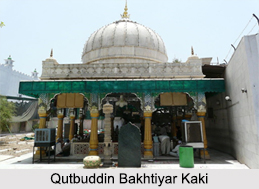 Qutbuddin Bakhtiyar Kaki was the spiritual master of King Altamash, who professed his allegiance to the Chishti Order and gave it his royal patronage. Right from the beginning, Sufi saints were being highly regarded by the rulers. Muhammad Ghori had appointed Qutub ud din Aibak, one of his slaves (and the founder of the slave dynasty), as the Viceroy in Delhi. His successor was King Altamash. He took Shaikh Qutbuddin Kaki, more popularly known as Qutbuddin Bakhtiyar Kaki as his spiritual master.
Qutbuddin Bakhtiyar Kaki was the spiritual master of King Altamash, who professed his allegiance to the Chishti Order and gave it his royal patronage. Right from the beginning, Sufi saints were being highly regarded by the rulers. Muhammad Ghori had appointed Qutub ud din Aibak, one of his slaves (and the founder of the slave dynasty), as the Viceroy in Delhi. His successor was King Altamash. He took Shaikh Qutbuddin Kaki, more popularly known as Qutbuddin Bakhtiyar Kaki as his spiritual master.
Shaikh Qutbuddin Kaki was born in 1186 AD at Farghana in Isfahan, where he had the fortune of meeting his master Khwaja Muinuddin Chishti who was on his way to India, in the mosque of Abu al Layth. He also had the fortune of receiving knowledge from Shaikh Shihabuddin Suhrawardi. He followed his master Khwaja Muinuddin Chishti to India. His reputation as a great saint, however, travelled faster than him. It is believed that he was a saint by birth and many miraculous events are associated with him. He acquired his name `Kaki` (a man of cakes) when on demand from his friends, he put his hands in a tank of water and produced from there hot cakes to feed his friends. The name Bakhtiyar was given to him by his Master Shaikh Muinuddin, which means `a fortunate person`.
When the news of arrival of Shaikh Qutbuddin Kaki to Delhi reached the King, he along with his populace received him with great respect. They requested him to reside in Delhi. Khwaja Muinuddin Chishti also asked him to stay in Delhi and appointed him as his Vicegerent. King Altamash offered him the Office of the Chief Qazi, which he refused and, therefore, Nazimuddin Sughra another disciple of Khwaja Muinuddin Chishti was appointed to that Office.
It was during the time of Qutbuddin Kaki that devotional music was introduced in the Chishti Order, as a means of achieving the state of ecstasy. It was considered by him that the harmony of sounds stirs the heart of the listener and arouses in him the love for God. When these musical functions became very popular, the orthodox Muslims took up the matter with King Altamash to put a stop to it, as it was against the Shariat. King Altamash, however, found it very embarrassing for him to do anything in the matter on account of his loyalty to Shaikh Qutbuddin Kaki on the one hand and the disapproval of Islamic laws for such functions on the other. He, therefore, did not intervene in the matter and such musical functions started gaining more and more popularity and acceptance by the common people.
Qutubuddin Bakhtiyar Kaki influenced Sufism in India to a great extent. He continued to develop the traditional ideas of universal brotherhood and charity within the Chisti order and played a major role in establishing the order securely in Delhi. Qutubuddin Bakhtiyar Kaki forms an important part of the Sufi movement which attracted many people to Islam in India in the thirteenth and fourteenth centuries.



















